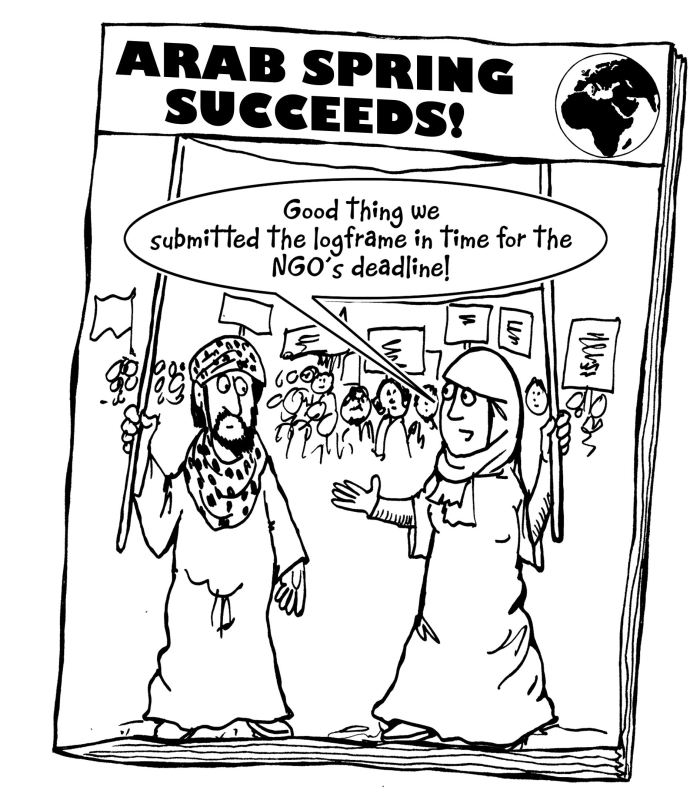Aid workers and development practitioners, how many times have you seen a paragraph like this in a proposal?
“Community Mobilization: To ensure communities are… community management committees (CMCs) will be formed. Based on accepted cultural practice, CMCs will be chosen by the community members themselves with strong encouragement on establishing a gender-balanced CMC. The CMC will represent the community and be responsible for ensuring effective community participation. Training events will be designed, organized and conducted to educate CMCs and regular meetings will be conducted to enable communities to stay abreast of current project activities. CMCs will take the lead for recruiting, training, and equipping volunteers to ensure that they are functional in the areas of…”
I’ve been in a lot of aid transparency and open data conversations in Washington, DC lately. And too many times now, I’ve heard the phrase and/or sentiment that, “We will need to build an ecology of people who can use the data.”
The underlying ideas behind the insanely shallow and presumptive paragraph above and this idea that an “ecology of people” needs to be built is absurd. Liaising and relying upon existing stakeholders, structures, and community groups is infinitely more effective and efficient that creating new networks or committees, especially in a short-term project.

These examples reveal one of the social good industry’s most killer assumptions: That in the developing world, nothing exists, i.e. that there’s a blank slate upon which our interventions can be built.
From DC, I wonder how much of it can be attributed to Robert F. Kennedy’s description of “the shaping impulse of America”? I’ve seen it in the field as well though and among other westerners. It’s the need to “create” and “build” rather than “strengthen,” “transform” and “amplify.” It’s magical thinking and a changing world means it’s time to shift this mindset.
Yes, yes, aid workers have been trained to talk about how much context matters, but why then are our approaches, programs, procedures, practices, meetings, and the words and tone we use still not centered on tapping existing capacity and local resources?
Much of it may come from donor-centric ways of thinking. We’re all the center of our own worlds. But if we’re not careful, there is a self-importance that can come with power and the isolation of capital cities. Just because you don’t know about the full contingent of players in a country or a locality, doesn’t mean that nothing is happening there. Just because it’s the first time you’ve heard of something, does not make it “new.” Some would unreluctantly call this arrogance a neo-colonial mindset.
This inventing mentality results in lots of wasted resources, efforts, expertise, and learning and in lots of frustration and misunderstanding. If we believe that we have the innate right, ability, and resources to get involved in “solving” someone else’s problems, does this somehow make us less responsible for our interfering, rather than supporting, roles? It’s time to admit that the myth of low capacity means we keep working. It might be in our interests to perceive and act as if nothing exists, that it’s our projects that will make the difference.
It is difficult to get a man to understand something when his salary depends upon his not understanding it. ~Upton Sinclair
My thinking is evolving and to me, it’s not longer about “for” vs. “with.” A changing world requires that development cooperation must be about “in response to.” It’s not about ideas. It’s not about people. It’s about both. Whose ideas is what matters.
So how can we aid workers, development practitioners, philanthropists, social entrepreneurs, and do-gooders re-shape ourselves so that we no longer act as if we are starting from scratch? How does our work and our roles change if our first responsibility is to do justice to the vast and vital efforts of strong leaders and ordinary people in the developing world that are this very day working to change their neighborhoods and their nations? What if we didn’t need to know what to do to address problem X. (We don’t.) What if that didn’t even have to be up to us? (It’s not.) Do we talk and theorize and rationalize less? (Yes.) Convene and listen and respond more? (Yes!)
It’s time to acknowledge that change is already happening all around us, in spite of us, rarely because of us. Would the social good industry fall apart if we were less attached to our budgets and projects and technical advice, and we were more curious and focused on getting behind the forces of social change?
I, for one, would like to find out. Let us create nothing.
***
Related Posts
Does aid need a 12-step program?
Overlooking the Capacity of Local Organizations
What’s needed to put local champions at the forefront?
The elephant hasn’t left the room: Racism, power & international aid

This is perfect. Everyone working in any of the fields mentioned should read James Ferguson’s brilliant case study ‘The Anti-Politics Machine’ – teasing out the rationale of how the best-intentioned development projects fail both by accident and by design.
Pingback: Self-criticism will not change the world | Mindfulnext
Pingback: 10 Great Social Innovation Reads: November 2013 | Social Velocity
Pingback: Recommended Reading from Jacob Harold | GuideStar Blog
Pingback: 10 Great Social Innovation Reads: November 2013
Pingback: From the Network: Alum News, Job Postings, and More – Rockwood Leadership Institute
This is really great. Something I have struggled throughout my career in NGOs. Luckily I learnt very soon that we were adding to their challenges than resolve the existing ones.
Yes!